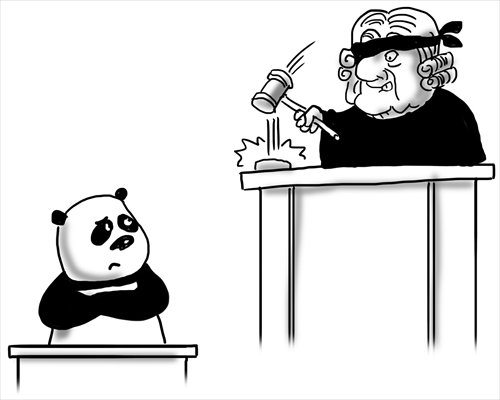
(Illustration: Global Times/Liu Rui)
In late October, 2015, the UN Convention of the Law of the Sea (UNCLOS) Tribunal issued the Award on Jurisdiction and Admissibility in the Philippines-China arbitration case. The panel of five judges unanimously ruled that among the 15 specific submissions for redress presented by Manila, the Tribunal does have jurisdiction with respect to the matter raised in seven of the submissions, and the jurisdiction over the remaining eight submissions will be determined together with merits.
The Tribunal has failed the principles of justice. First, the composition of the Tribunal and the selection of arbitrators were not equitable. As the Chinese government has long stated that it will not participate in or accept the arbitration, it cannot appoint its arbitrators, thus cannot maintain China's legitimate rights on the Tribunal.
Given the absence from the proceedings of one party, the selection of arbitrators needs to be cautious. However, Shunji Yanai, President of the International Tribunal for the Law of the Sea, who is Japanese, arrogated all powers to himself at a time when the China-Japan relationship was at its lowest ebb over the Diaoyu Islands dispute.
On April 24, 2013, Yanai appointed Chris Pinto of Sri Lanka as judge of the Arbitral Tribunal. But on May 21, Pinto resigned, citing that his wife is a Filipino national. Pinto did not need to consider that long but should have stepped down right away. This procedure shows that without the participation of the Chinese government, the composition of the Tribunal and the appointment of arbitrators are suspected of under-the-table dealings. The core interests of the Chinese government are put in danger.
Second, the arbitrator who was selected to represent China sided with the Philippines, which is not acceptable. Under normal circumstances, the ruling over international disputes should allow for opposing votes and reservations. The ruling of international courts is no exception. On August 25, 2006, the Chinese government filed a statement to the Secretary-General of the UN saying that it "does not accept any of the procedures provided for in Section 2 of Part XV of the Convention with respect to all the categories of disputes referred to in paragraph 1 (a) (b), and (c) of Article 298 of the Convention." China gains absolute advantages, while the Philippine government has expressly excluded the issue of territorial sovereignty by avoiding Article 298 of the UNCLOS.
Alfred Soons, an arbitrator of the case, believed the status of islands was closely associated with demarcation and sovereignty issues in an article he co-authored with other people a few years ago. But he has changed his stance. As an arbitrator representing China, he was supposed to support China's stance. Rather, he voted in favor of the Philippines. This makes the Chinese people doubt the justice of the Award and the integrity of the arbitrators.
Third, the initial ruling during the proceedings does not conform to international practices. The ruling during the proceedings must clarify whether the Tribunal has jurisdiction with respect to the matter raised in the 15 submissions presented by the Philippines. However, as the Tribunal ruled that it has jurisdiction with respect to the matter raised in seven of the submissions, the other eight should be turned down.
But the Tribunal has shown partiality for the Philippines by considering the seven other submissions in conjunction with the merits and requesting the Philippines to clarify and narrow one of its submissions. It is actually bluntly supporting the Philippines' claims.
Fourth, on December 5, 2014, China issued a Position Paper of the Government of the People's Republic of China on the Matter of Jurisdiction in the South China Sea Arbitration Initiated by the Republic of the Philippines, which stated reasons why China neither accepts nor participates in the arbitration. The Chinese Embassy in the Netherlands sent a note verbale and accompanying Position Paper to the five members of the Arbitral Tribunal.
China has consistently stated that the aforementioned communications should not be interpreted as China's participation in the arbitral proceeding in any form. However, the Arbitral Tribunal considered that the communications by China effectively constitute a plea concerning the Arbitral Tribunal's jurisdiction. The arbitration on substantive matters is not expected to be in favor of China, and the Chinese government will not admit or implement the arbitration on substantive matters. China could denounce UNCLOS and set a legal basis for not implementing substantive rulings unfavorable to itself in the future. Meanwhile, it will not be bound to similar requests made by other sea claimants such as Vietnam and Japan.


















































